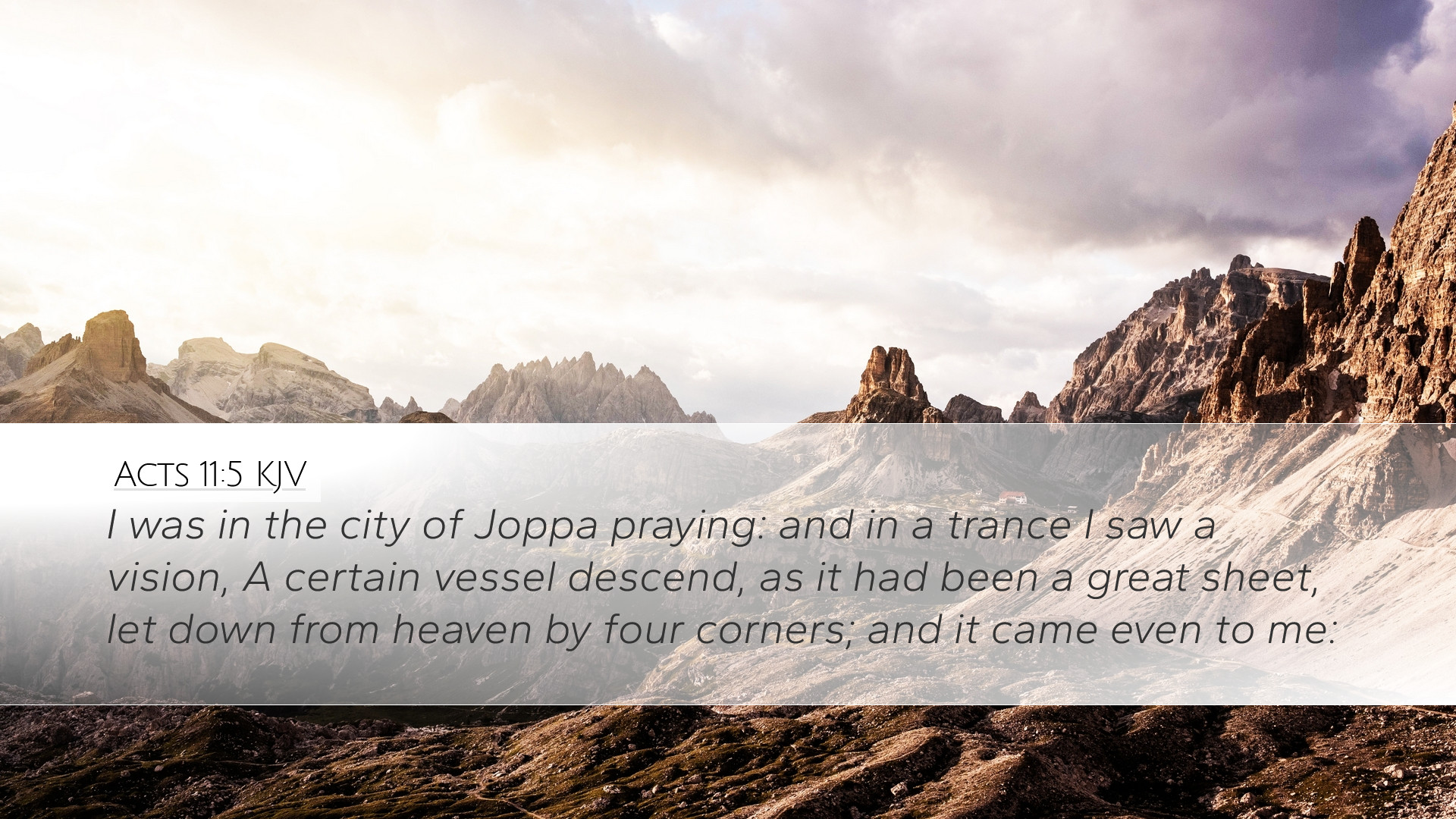Commentary on Acts 11:5
Acts 11:5 states: "I was in the city of Joppa praying; and in a trance I saw a vision, a certain vessel descend, as it had been a great sheet let down from heaven by four corners; and it came even to me."
This verse is a significant moment in the narrative of the early Church, marked by divine revelation and the unfolding of God's plan for Gentile inclusion. Below, we explore this verse through insights from several public domain commentaries, emphasizing theological implications and practical applications.
Context and Overview
Before diving into the specifics of Acts 11:5, it is important to understand its context. This verse is part of Peter's recounting of his vision and the resulting implications for the church regarding the inclusion of Gentiles.
Historical Context
In the early church, a significant divide existed between Jewish and Gentile believers. The Jewish Christians viewed Gentiles with skepticism, often refusing to fellowship with them due to inherited customs and laws. Acts 10 sets the stage for a radical shift, and Acts 11:5 serves as a reminder of Peter's transformative experience.
The Vision Explained
In this verse, Peter describes his trance and the vision he experienced. Each aspect of this vision represents critical themes that bear significant theological weight. Let us examine these through the lens of notable commentaries.
Matthew Henry’s Perspective
Matthew Henry underscores the importance of prayer in the believer’s life, emphasizing that Peter was praying when he received the vision. He notes:
- The Role of Prayer: Prayer prepares the heart for receiving divine revelations. It is during this time of communion with God that Peter was given clarity regarding his mission to Gentiles.
- Divine Guidance: The vision itself—a vessel descending with clean and unclean animals—symbolizes God's suspension of the dietary laws, which had previously segregated Jew and Gentile.
Albert Barnes’ Insights
Albert Barnes offers a detailed examination of the vision's symbolism, noting:
- The Sheet: The great sheet represents a divine declaration that distinctions of clean and unclean are abolished in Christ. This highlights the new order that Jesus established through His ministry.
- Four Corners: The four corners symbolize the universality of this message, suggesting that the gospel is not limited to a particular group but intended for all of humanity.
Adam Clarke’s Commentary
Adam Clarke elaborates on the significance of the vision and Peter’s trance, emphasizing the following points:
- Spiritual State: Clarke describes the 'trance' as a heightened spiritual experience where Peter was open to divine communication. It reflects the necessity of being spiritually attuned to receive God’s guidance.
- God’s Sovereignty: The descent of the vessel illustrates God’s authority over the sacred and the profane. He determines what is clean and unclean, challenging traditional Jewish perceptions.
Theological Implications
This verse, and the vision it describes, raises critical theological themes:
- Inclusivity of the Gospel: Acts 11:5 marks a pivotal moment in church history, affirming that the gospel of Jesus Christ is for all nations, races, and backgrounds.
- Transformation of Identity: Through this vision, God is reshaping the identity of His people—removing barriers erected by religious and cultural traditions.
- Role of the Holy Spirit: The divine intervention in Peter’s life demonstrates the active work of the Holy Spirit in guiding believers to fulfill God’s commands beyond societal norms.
Practical Applications
As pastors, students, and theologians reflect on Acts 11:5, several practical applications emerge:
- Prayer as Preparation: Believers are encouraged to cultivate a life of prayer, remaining open to God’s leading and willing to confront cultural biases.
- Engagement with the “Other”: This passage challenges Christians to reach out to those outside their traditional circles, fostering inclusivity and mutual understanding in the Church.
- Validity of Divine Revelations: There is a call for discernment in understanding God’s guidance in contemporary issues, aligning personal beliefs with scriptural truths.
Conclusion
Acts 11:5 offers profound insights into the workings of God in shaping His church. Peter's vision is a microcosm of the gospel message, which transcends human-made barriers. Through the contemplation of this verse, believers are reminded of the radical openness of God’s grace and the imperative to reflect such inclusivity within their own lives and ministries.
In light of these insights, may we embrace the transformative power of the gospel and the conviction to be agents of change in a world that desperately needs the hope found in Jesus Christ.


